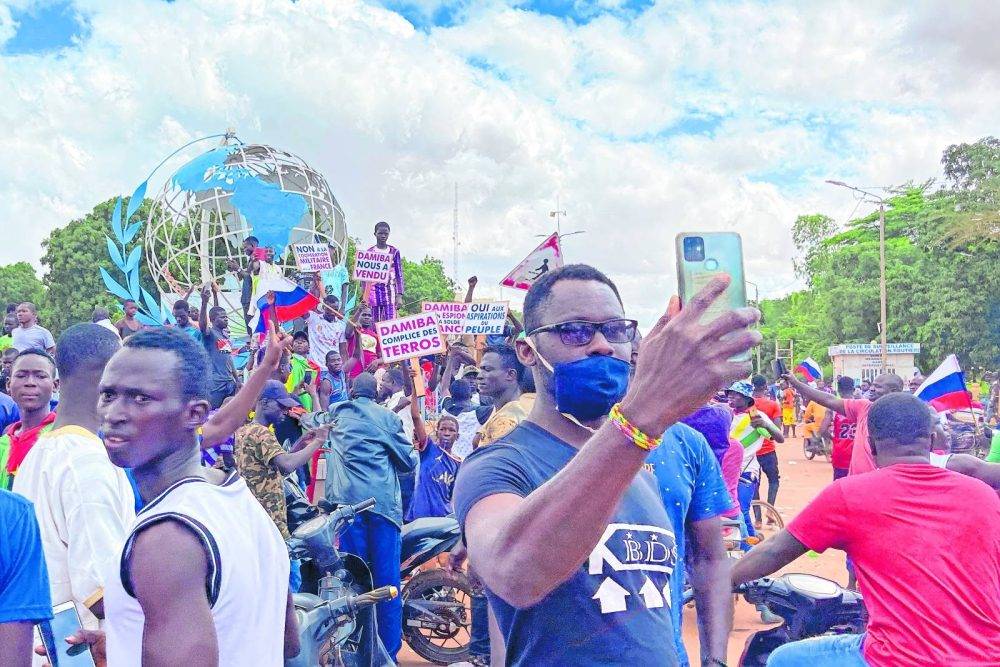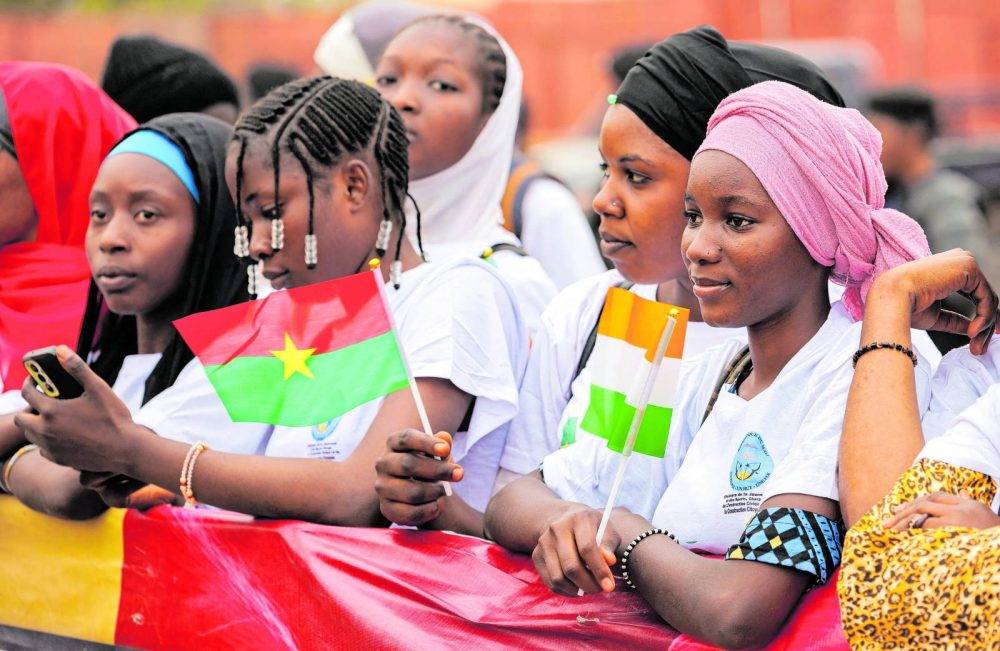
Discontent: Protesters carry Russian flags as they protest in Burkina Faso’s capital Ouagadougou outdoors the French embassy as unrest simmers. (AFP)
On 16 August, the Alliance of Sahel States, fashioned by Mali, Burkina Faso and Niger — all led by army juntas that withdrew from the Financial Neighborhood of West African States — celebrated its first anniversary. Lately, army takeovers have elevated in West Africa, erasing years of democratic progress.
These coups are rationalised as responses to insecurity and corruption, however they’re more and more primed by disinformation campaigns that secretly stoke false narratives to melt the bottom for democratic backsliding. International actors orchestrate practically 60% of those campaigns and have an increasing arsenal of algorithmic techniques to distort info to their benefit.
Via social media manipulation and different international info manipulation and interference (FIMI) strategies, these campaigns inflame political discourse and body democracy as a failed Western-imposed system whereas positioning authoritarianism as a simpler various.
Final month, a gaggle of specialists and stakeholders convened in Lagos, Nigeria, to take inventory of this downside and strategise collaborative responses. Good Governance Africa participated on the again of a current version of its quarterly publication, Africa in Truth, which tackled synthetic intelligence and the rise of disinformation.
The gathering of about 30 counter-disinformation researchers and civil society practitioners examined how FIMI contributes to democratic erosion in Africa and embraced a collective defence framework. Specialists highlighted how disinformation campaigns — continuously originating from Russia and pro-Russian operatives (40% of recognized campaigns in Africa) — have intensified the spate of army coups, particularly within the Sahel, and outlined how democracies should replace and invigorate their info areas for this new actuality.
Whereas democratic dividends and help in Africa outweigh autocratic ones, democracies should ship tangible progress, together with within the info house, to enhance individuals’s lives and counter false narratives.
The Sahel area is a telling case of how disinformation can destabilise fragile democracies. Lately, Islamist insurgencies, financial hardships and weak establishments have opened the door to a sense of disaffection with democratic governments amongst some segments of society. Disinformation campaigns have taken benefit of those vulnerabilities, portraying democracy as inept, international and unable to deal with the area’s issues.
In addition they place the West because the supply of those issues, exploiting resentment of French insurance policies throughout a lot of francophone West Africa. Russia, as an example, has been linked to media retailers and social media accounts that clandestinely broadcast narratives of Western hypocrisy and exploitation. Russia’s techniques have additionally included amplifying terrorist propaganda in opposition to Sahel governments earlier than the area’s army coups.
The campaigns, in flip, provide authoritarianism as a realistic and even obligatory response to Africa’s advanced issues. They’ve additionally grown to incorporate claims of a “new world order,” the place multipolarity, noninterference and the rejection of democratic governance fashions are promised to vary the fortunes of African international locations.
These messages resonate in some quarters of West Africa the place residents really feel let down by their governments, powerless within the worldwide system and disillusioned by the sluggish tempo of democratic reforms. When democracy is perceived as a supply of instability, the trail to authoritarianism can appear much less perilous, even fascinating.
This message performs immediately into the arms of authoritarian sympathisers, creating fertile floor for coups and delayed transitions again to civilian rule. Navy juntas, as soon as in energy, typically justify their takeovers by promising to revive order and independence from international affect, however their observe information typically recommend in any other case.
A current investigative report reveals that help for the Sahel juntas is dwindling due to their failure to ship on guarantees, in addition to the tough techniques employed by Russian mercenaries in opposition to the civilian inhabitants.
Afrobarometer stories that Africans’ satisfaction with democracy has dropped from 50% in 2011 to 39% in 2023. Equally, over the previous decade, help for democracy has fallen by seven proportion factors (though nonetheless the preferred system of governance), whereas opposition to army rule has weakened by 11 factors.
These developments mirror a seek for change and a resurrection of army rule’s repute, pushed partly by its promotion by disinformation networks.
Regardless of the issues of real-world democracies, the previous three a long time have proven that African democracies ship higher governance (significantly in authorities effectiveness, safety and corruption management) than autocracies, which permits residents in these techniques to derive larger advantages from the state.
Democracies, although imperfect, present a system the place residents have a voice of their governance, leaders are accountable and human rights are protected. Democratic governments, particularly these which can be inclusive and clear, are higher geared up to handle sources and ship financial development, providers and safety.
Furthermore, democracies provide basic freedoms and rights that disappear beneath authoritarian regimes. Democratic rules similar to liberty, equality and justice are important to human dignity and are being eroded in Africa’s coup-hit international locations. Though authoritarian regimes could provide short-term pleasure by means of fast-paced decrees and shows of would possibly, they achieve this at the price of private freedoms, political pluralism and human rights.

Over time, such techniques breed discontent as residents change into more and more conscious of the restricted effectiveness of authoritarian techniques and the tough rule they impose on the civilian inhabitants. In contrast, democracies permit for a extra peaceable switch of energy ruled by the rule of legislation and provide residents a voice in decision-making.
To counter the rising enchantment of authoritarian narratives, Africa and different democracies should reassert these core rules and re-equip their info sectors to mirror and allow these rules. However past rhetoric, democratic governments should ship tangible outcomes for his or her residents.
Good governance, financial alternative, social inclusion and accessible and correct info are key to creating the case for democracy. When residents see their lives enhance beneath democratic rule, the enchantment of authoritarian alternate options diminishes.
The very nature of democratic governance will depend on the flexibility of residents to make knowledgeable choices based mostly on factual info. Put merely, info is the air democracies breathe.
One motive we belief democracy as a system of governance is the concept it could ship higher choices and outcomes than autocracy as a result of the “knowledge of the gang” outperforms anyone particular person. However these benefits shortly change into vulnerabilities when “the gang” is disinformed and displaced by inauthentic voices. Even superior democracies grapple with countering disinformation with out infringing on freedoms of speech and thought.
In Africa and elsewhere, strengthening democratic establishments should go hand in hand with securing the knowledge house and orienting it towards constructive democratic exchanges. A method is thru the fence framework, a ground-up technique that includes creating protecting limitations in opposition to disinformation and manipulation.
This framework includes three key steps: accumulating strong knowledge on disinformation (posts), constructing networks and collaboration throughout sectors (slats) and informing the general public with focused, trusted communication (indicators). Examples from international locations similar to Taiwan and Sudan (earlier than the present civil conflict) present that native actors, supported by shared data and sources, are finest positioned to steer such efforts.
Past this, governments, civil society, the personal sector and different stakeholders should work collectively to advertise media literacy, regulate digital platforms and develop mechanisms to counter disinformation, appearing as defenders of those shared areas in order that they’re safe from interference.
In the end, democracy stays Africa’s finest hope for good governance and the truth-based info areas that bind its social contract. The ethical, developmental and safety benefits of democracy are clear. However they have to be communicated successfully, particularly within the face of well-funded and well-organised disinformation campaigns.
Extra importantly, the strongest argument for democracy comes when democratic governments ship actual, tangible advantages — similar to supporting the event of wholesome and strong info areas — that enhance and enrich the lives of their residents.
Nnaemeka Ohamadike is a senior knowledge analyst at Good Governance Africa. Mark Duerksen is a analysis affiliate on the Africa Heart for Strategic Research.